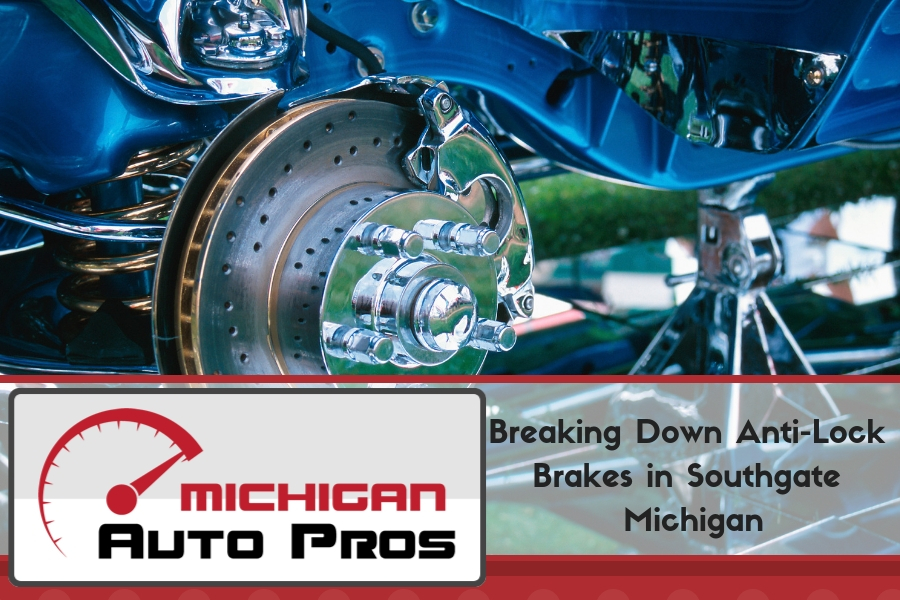Chances are you’ve heard about anti-lock brakes. That’s probably why you’re here. The chances are even better, though, that your car is equipped with them. In fact, virtually all modern cars are. Anti- lock brakes (or ABS for short) are one of your vehicle’s primary safety features – right up there with air bags. But they do have their drawbacks. If you’re looking to better understand anti-lock brakes and why you need them, along with basic operating principles and as well as their limitations then you’ve come to the right place.
Why ABS?
In short, anti-lock brakes afford better control and decreased stopping distance under vigorous braking. Through a network of sensors and hydraulic valves, the ABS system can detect irregular wheelspin and apply rapid pulsing of the brakes while avoiding full lockup. While your ABS are always on standby, they rarely engage. In the days before ABS, drivers would need to “pump the brakes” when coming to a hard stop. This consisted of manually stepping on the brake pedal in a series of controlled pulses. The idea is to apply maximum braking force without locking up the tires. Once your tires lock, your ability to control the vehicle goes out the window and the probability of an accident goes up exponentially.
Pumping the brakes is a perfectly viable technique, but under stress it’s incredibly difficult to apply properly. Anti-lock brakes help you focus on maneuvering the vehicle, without the burden of executing an advanced braking technique under duress.

The Perks of ABS
Obviously enhanced safety is a big one, but an ABS-equipped vehicle offers more than just shorter stopping distance.
- Cheaper Insurance – It’s true. Some insurance providers will offer lower premiums for vehicles with ABS systems in good working order.
- Slippery Conditions– ABS will help slow you down in the event you begin to slide. Even if you’re not braking hard, it can be quite easy to slide through a stop sign or intersection during inclement weather. Anti-lock brakes can offer a major advantage when driving in these conditions.
- Improved Traction Control – ABS and traction control systems work in a similar fashion. The synergy between them plays a major role in their incorporation to the vehicle’s overall design and having anti-lock brakes allows a more sophisticated and better-performing traction control package to be utilized.
The Drawbacks
As with most things in life, there is no free lunch – and that includes anti-lock brakes. While the benefits generally outweigh the drawbacks, fully understanding what ABS can – and can’t – do will help you make more informed decisions when it comes to shopping for, maintaining, and driving a vehicle.
- Loose Surfaces – Gravely roads and unpacked snow can cause ABS systems to sometimes act unpredictably and engage under braking forces less than normally required, which may create a challenge for some drivers.
- Inconsistent Stop Times – Some drivers note inconsistent stop times with anti-lock brakes. There are several external variables at play, with road conditions being at the forefront. Although ABS will typically stop any car faster than non-ABS equipped vehicles, the stop times may vary and could confuse an unsuspecting driver.
- Maintenance, Upkeep, and Cost – Unsurprisingly, ABS-equipped cars can potentially be more expensive to maintain. Any time an additional system is added, areas of maintenance and potential failure are introduced as well. Although today’s ABS systems are incredibly low maintenance, they will eventually wear down and should be accounted for when planning the costs of your car’s upkeep. Should you need maintenance, the most common components; the control module and the wheel sensors can run upwards of $600, and $200 respectively.
The ABS Light: A Cause for Concern?
Generally speaking, any car equipped with ABS also has an ABS light that may appear on the dashboard. The most common instance is upon startup, the light (along with several others) may appear briefly. Should your anti-lock brakes engage, the light may also appear as either a flickering or a solid light – generally orange. Should your car detect a fault in the anti-lock braking system, it will display a solid ABS light indefinitely. It’s entirely possible to continue driving safely without ABS, as people did long before the technology existed. If your brake pedal feels normal and your car otherwise handles as expected, then it’s probably safe to continue to your destination – just don’t expect your anti-lock brakes to engage in an emergency. Of course, ABS are a tremendous boon to vehicle safety, and it’s best to get them inspected at your earliest convenience.
At Good Care Auto, we’re equipped to handle all types of anti-lock braking systems. In fact, their ASE-certified technicians are equipped to handle all braking components from pads and rotors, to sensors and brake boosters. If you suspect your anti-lock brakes are in need of service, their trained technicians utilizing the latest equipment and expertise are standing by. They are only a phone call away and can have you back on the road in no time. Call Good Care Auto in Southgate Michigan at (734) 285-1188 and schedule an appointment today!
